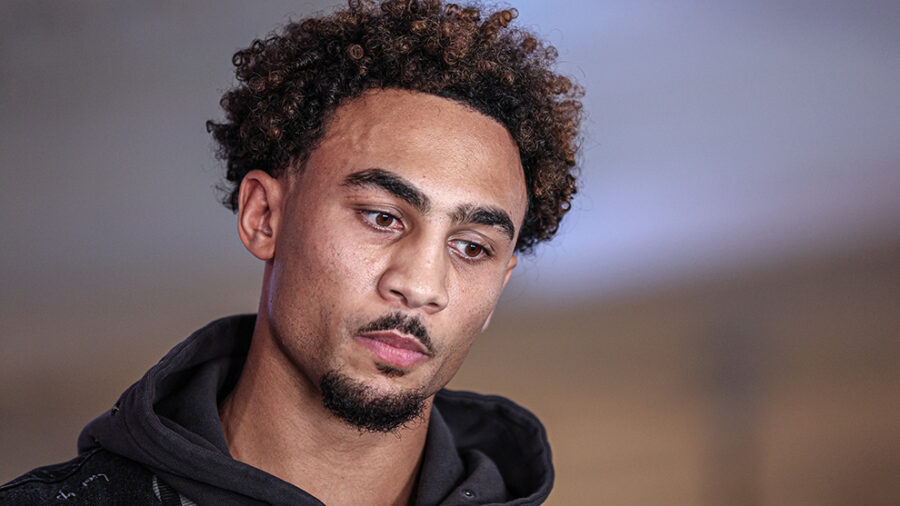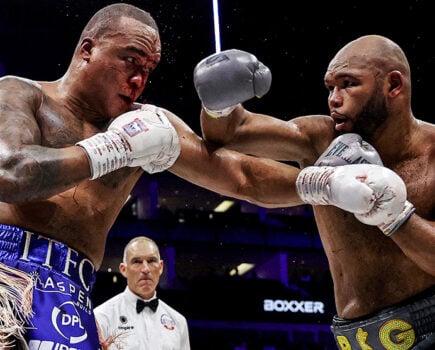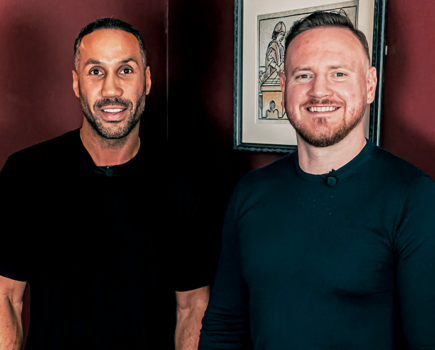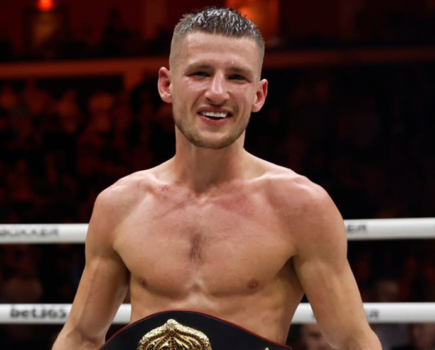IT started with a voice in the crowd. Loud, confident, obtrusive, unwelcome. Hearing the voice, each member of the gathered crowd turned, wondering first if the interruption had been planned, and next if anyone around them could put a name to the face of the man whose words had caused it. From there, attention naturally turned back to Ben Whittaker, the man whose own voice had been silenced by this latest one. We wondered then if maybe Whittaker would be able to provide some context to what was going on. We wondered then if perhaps he had the insight we all lacked.
At that point, you see, watching from the back of a hotel conference room in London, it could have been just about anyone. It could, for example, have been a disgruntled hotel guest from whom Whittaker had earlier stolen a leopard-print robe, or, for that matter, a disgruntled former Whittaker opponent demanding the “respect” he was never shown from Whittaker back when they shared a ring. It could have been the voice of one of those new boxing managers who offer their every thought on every subject in either cars or conservatories to fans on Zoom. Or it could have been Mauricio Sulaiman with a new belt, or Turki Alalshikh with a new idea. It could have been a retired fighter trying to flog CBD oil, or the physical manifestation of a Ryan Garcia tweet. More likely, with Ben Whittaker on stage, it could have been the ghost of Frankie Randall demanding the return of his old nickname: “The Surgeon.” Or, if not that, it could have been Emanuel Augustus wanting all his old moves and entire identity back.
For now, all we had was an accent and some words. According to these words, he wanted a fight apparently, this man. A fight against Whittaker. A fight for money. He also accused Whittaker of so far fighting complete nobodies and avoiding him, which was the moment countless fans armed with cameras enabled caps lock on their phones ready for the headline. Whittaker, mind you, was unwilling to play the same game. He instead cooled any simmering tension, in fact, by saying, “Someone get this man a Sprite and a banana,” at which point all you heard in the room was laughter.
He sort of then disappeared after that, the gatecrasher; the man with a voice but no name. Guided out the room via a side door, directly into a lobby, the agitator had achieved his goal and promptly scarpered, never to return. There was really no need to, either, for the mission was accomplished. The room after all would soon learn that he was not merely an attention-seeker looking to create chaos for online clout but was in fact a boxer. An actual boxer. A boxer like Whittaker.
How refreshingly old-school, too, to see a boxer in the wild, in real life, go to the effort of turning up at another man’s press conference when he could have so easily stayed at home and harassed the man online, as so many in boxing these days are apt to do. How wonderful to know some are still willing to go that extra mile, analog men in a digital world.
Later, we even got his name: Ezra. Ezra something. The surname would have to wait. It would have to wait, that is, until a better phone signal allowed BoxRec.com to load on my phone. Until then, just for fun, I tried to recall all the famous Ezras I knew. Pound; poet. Koenig; musician. Miller; actor. In boxing terms, Sellers was the only one coming to mind, though it could not be him for he sadly died in 2013.
No, this Ezra was a voice and a name new to us all. Ezra Arenyeka. That was his name. Or, to give him his full title: Eworitse Ezra Arenyeka. Born in Nigeria, but based in Sale, we all discovered, at pretty much the same time, that he was a 28-year-old known as “African King” who currently held a record of 12-0 (10), hence his unwavering confidence. He had fought in Britain once before, against Mohamed Cherif Benchadi in 2022, but had campaigned mostly in Nigeria, with the odd appearance in Ghana, Holland, and Colombia.
“Would you like to interview him?” a few of us were asked that afternoon.
“Who?”
“Ezra. He’s outside.”
Still unsure whether he was a boxer or not at this stage, never mind whether one of repute, I sensed the majority of people offered this opportunity politely turned it down. Boxing News certainly did, if just to make a stand: don’t feed the birds; don’t pay any mind to attention-seekers. Or something like that.
And yet, despite the belief that refusing him extra attention was the right thing to do, there remained a far greater belief that Ezra Arenyeka had played a blinder and that the last laugh would ultimately be his. Indeed, when watching him go about his work I was reminded of the time Mahmoud Charr – then “Manuel” – did something similar at a press conference at Upton Park following David Haye’s fifth-round stoppage of Derek Chisora in July 2012. That night, as Charr approached Haye at the top table, the reaction had been very much the same. Who is this man? What is he doing here? Why should Haye fight him next? Yet, regardless of all that uncertainty, the approach worked. Suddenly, without beating anybody of note, and despite the fact nobody knew his name, Charr, the so-called “Diamond Boy”, was booked to fight Haye that September. It probably would have happened, too, that fight, had Haye not found a more entertaining and marketable circus act in the form of Tyson Fury not long after the Charr fight had been signed.
Arenyeka, likewise, will on June 15 at Selhurst Park be rewarded for his nerve, his chutzpah, and his self-promotion. That’s when he will, as hoped, actually fight Ben Whittaker, receiving in the process the chance to back up everything he yelled at the former amateur star at a press conference in a London hotel. Better yet, for both Arenyeka and Whittaker, a single and unexpected outburst at a press conference has managed to ensure this light-heavyweight fight on June 15 will be the most compelling and meaningful of Whittaker’s fledgling pro career. That’s quite the feat when you consider nobody, at the time of the opponent’s outburst, could be certain he even boxed for a living.






